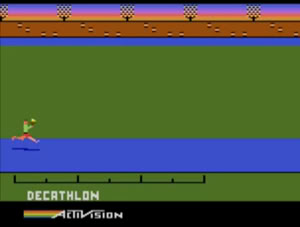Editor's note: In response to Christian Higley's article challenging the notion that indie games must be fun to play, Cameron widens the debate by appealing to mainstream developers to make games that have unpleasant or physically taxing sequences. Such moments, Cameron argues, can do a lot to strengthen the bond between the player and their in-game avatar. -James

In his recent post, Indie Games Should Keep Acting Like Indie Games, Christian Higley defended indie developers who make games that intentionally avoid being fun. I agree with much of what he said and would love to see more games take the risk of providing something other than a good time. But this isn't relevant only to indie gaming.
By definition, mainstream developers aren't willing to step outside of established conventions — most specifically, the idea that video games are ultimately all about having fun. But occasionally a few have, and looking back on a couple of them can provide ideas for future experiments in the unenjoyable.
I've always been a bit of a contrarian in my taste in games, and one of my favorites as a child was The Activision Decathlon, for the Atari 2600. The game's notorious control scheme required the player to frantically wiggle the joystick from side to side in order to run faster, which usually resulted in exhaustion and even pain by the end of an event. Lots of retro game enthusiasts complain about the cumbersome controls, and while they're not to everyone's taste, it's not as if Activision's programmers were unaware of what they were doing. They wanted to make the player feel like she would if she were participating in a real sporting event. That was what I loved about the game. Winning the 1500 meter race was grueling, but the sense of accomplishment was far greater than it would have been if the game were easier to control.
French developer Quantic Dream has also experimented with the technique of forcing players to empathize with characters by way of physically exhausting mechanics. In one scene toward the end of their 2005 game, Indigo Prophecy, protagonist Lucas Kane has to carry another character through a blizzard — a feat accomplished (on Xbox) through the rapid, alternating pressing of the left and right triggers. Even the most dextrous players will start to feel the burn as Lucas laboriously trudges through the quickly accumulating snow.
This event is not fun, but like the long races in The Activision Decathlon, when it's over, a sense of camaraderie has formed between player and character. It's almost as if the two were cooperating, rather than the former simply controlling the latter.
 If its demo is any indication, Quantic Dream's next release, Heavy Rain, will have its share of these moments, too. Using a series of quick time events to guide the overweight, asthmatic Scott Shelby through a fight in a hooker's apartment isn't what anyone would call a good time. But that sequence made me care more about the well-being of the character I was controlling than even the most perilous moments of traditional action games. While nobody wants every game to be nothing but QTEs, this is still the kind of thing I wish we saw more of.
If its demo is any indication, Quantic Dream's next release, Heavy Rain, will have its share of these moments, too. Using a series of quick time events to guide the overweight, asthmatic Scott Shelby through a fight in a hooker's apartment isn't what anyone would call a good time. But that sequence made me care more about the well-being of the character I was controlling than even the most perilous moments of traditional action games. While nobody wants every game to be nothing but QTEs, this is still the kind of thing I wish we saw more of.
Games have a unique potential to make audiences participate in all kinds of events. That so many titles are content to put the player in the shoes of what is essentially an animated action figures is a failure of the medium. Sometimes, I want to play as characters who are flawed or even unlikable. More importantly, I want to be put into situations that make me uncomfortable. Those experiences are rarely fun, but that doesn't mean they're without value.
This isn't meant to be a cry for all games to incorporate intentionally cumbersome controls or to put the player in uncomfortable situations. Those things in and of themselves don't make for a satisfying experience — does anyone really think that tank controls improved old-fashioned survival horror games? But all conventions should be challenged, and that includes the convention that the defining characteristic of gaming is fun. This isn't a new idea, and there are plenty more examples from the history of mainstream games that I don't have the space to touch on here.
As gaming continues to mature, hopefully more developers will feel free to challenge players in different ways — some of which may be unpleasant. In games, just like in life, some of the most rewarding experiences are some of the least enjoyable.



